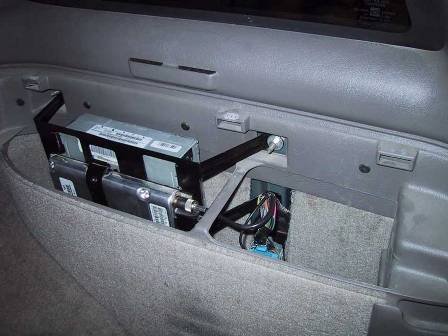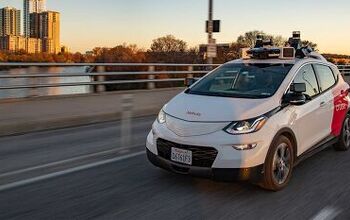OnStar: Big Brother's Eye in the Sky
Ever since the Model T hit the silver screen, evading the long arm of the law has been a cinematic theme. From the General Lee outrunning Boss Hogg, to Smokey being outwitted by Burt Reynolds' mustache, the public imagination has always associated fast cars with police pursuit. While the majority of motorists would never dream of trying to outrun the long arm of the law, soon, they won't have to. It'll be resting on their shoulder. Consider OnStar…
OnStar is a telemetry system providing a central data bank with real-time data on virtually every system in your car, including GPS. OnStar's computer knows where you were, when you were there, and how fast you went. It knows if and when you applied the brakes, if and when the air bags deployed, and what speed you were going at the time. It knows if and when your car was serviced.
OnStar operators can determine if you have a passenger in the front seat (airbag detection). All interactions with OnStar's operators are automatically recorded (hence the commercials). By the same token, under certain conditions, OnStar can switch on your GM car's microphone remotely and record any and all sounds within the vehicle (i.e. conversations). But wait, there's more…
As of 2009, customers who upgrade to OnStar's "Safe & Sound" plan automatically receive the "Stolen Vehicle Slowdown" service. (Yes, it's an "opt out" deal.) If the OnStar-equipped vehicle is reported stolen and law enforcement has "established a clear line of sight of the stolen vehicle," the police may ask OnStar to slow it down remotely.
Many customers find OnStar immensely reassuring; their guardian e-angel. No question: OnStar has saved lives and provided its customers with valuable services. Otherwise, they wouldn't be in business. But what if…
The police are investigating a crime. They ask OnStar where your car was on a certain date and time, to corroborate an alibi. Or what if you're in a crash and the other guy's attorney would like to know how fast you were driving when you ran the red light? Would OnStar surrender the information? "OnStar is required to locate the car to comply with legal requirements, including valid court orders showing probable cause in criminal investigations." And OnStar may use gathered information to "protect the rights, property, or safety of you or others."
Imagine the following scenario. The FBI shows up at OnStar master command and tells them your car's been stolen by a terrorist, who may be using it to commit a crime at this very moment. Contacting the owner is out of the question; the owner may also be a terrorist. What does OnStar do? They cooperate with the FBI and give them everything they've got on your car. No warrant needed and no notification to you. Hell, you may not even have the service enabled.
In other words, you not only have to trust OnStar to protect your privacy, you have to trust the police not to ask the questions in the first place.
The Constitution of the United States protects us from the heavy hand of government. However, when it comes to protection from private entities, it does little. Into this void, multiple privacy laws have entered, creating a farrago of local, state, and federal laws which provide limited and haphazard protection to citizens. Whatever privacy protection these laws provide are usually nullified when companies violate them in "good faith" (e.g. while assisting the authorities.)
So who is going to stop the government from monitoring your car? The Bill of Rights protects you from an unreasonable search and seizure; the government can not take what belongs to you without a warrant. OnStar can owns the information they collect about your car. In short, there is nothing to stop the police or OnStar from using the information you paid for against you.
And the next step is even more insidious. Imagine GPS speed limiters which only allow you to go the speed limit based upon a map uploaded into your car's navigation system. Now Sammy Hagar will only be driving 55 no matter how hard he stomps on the go pedal. This is the ultimate assault on pistonheads. The only place where driving will be fun will be on the track– if OnStar and/or the car's manufacturer (e.g. the Japanese GT-R) let you.
There's only one sensible response to this trend: boycott vehicles equipped with OnStar, even if you don't sign up for the service. (Remember: it can be remotely enabled.) If customers actively avoid vehicles that spy on them, manufacturers will have to stop installing the monitoring software and hardware. And law enforcement agencies and prosecutors will have to get their information and apprehend criminals the old-fashioned way: through legally-sanctioned police work. In short, I don't buy OnStar, and neither should you.
More by Jonathan I. Locker
Latest Car Reviews
Read moreLatest Product Reviews
Read moreRecent Comments
- Brian Uchida Laguna Seca, corkscrew, (drying track off in rental car prior to Superbike test session), at speed - turn 9 big Willow Springs racing a motorcycle,- at greater speed (but riding shotgun) - The Carrousel at Sears Point in a 1981 PA9 Osella 2 litre FIA racer with Eddie Lawson at the wheel! (apologies for not being brief!)
- Mister It wasn't helped any by the horrible fuel economy for what it was... something like 22mpg city, iirc.
- Lorenzo I shop for all-season tires that have good wet and dry pavement grip and use them year-round. Nothing works on black ice, and I stopped driving in snow long ago - I'll wait until the streets and highways are plowed, when all-seasons are good enough. After all, I don't live in Canada or deep in the snow zone.
- FormerFF I’m in Atlanta. The summers go on in April and come off in October. I have a Cayman that stays on summer tires year round and gets driven on winter days when the temperature gets above 45 F and it’s dry, which is usually at least once a week.
- Kwik_Shift_Pro4X I've never driven anything that would justify having summer tires.


































Comments
Join the conversation
it is just another way for someone to track you :{
anyone who doubts the cops can and will subpoena data check this out.... http://www.palmbeachpost.com/localnews/content/south/epaper/2008/03/19/0319mischief.html